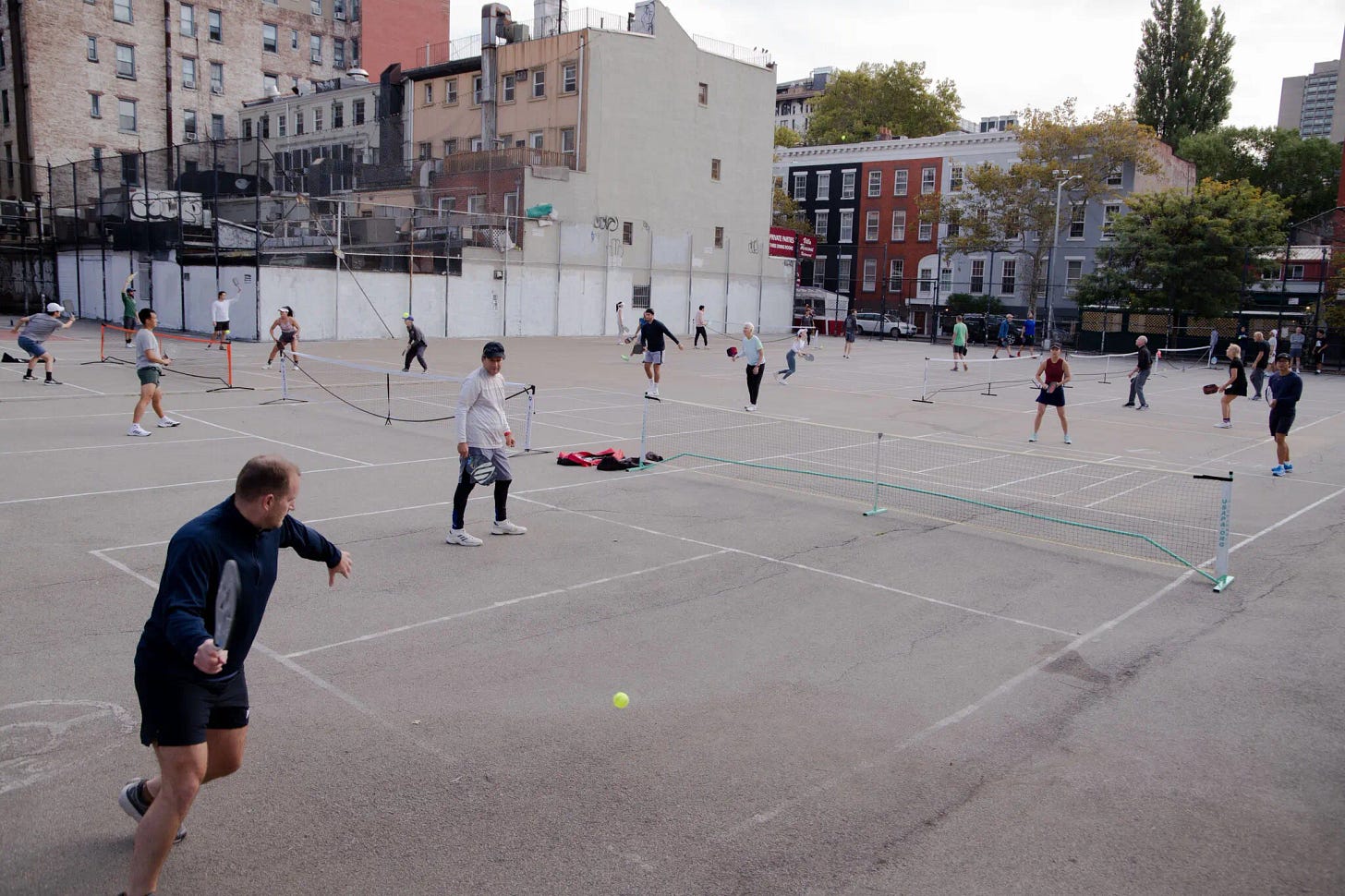Pickleball Is What Happens When You Kill Off Working Class Culture
I spent all last week writing about baseball, which is a sport I know pretty well, so I figured I’d change things up today and write about something I know almost nothing about: pickleball.
I’ve never actually played pickleball. I don’t think I’ve ever seen it in person. I know you play it with rackets, and it kind of looks like tennis, except smaller, and that it’s the “fastest growing sport in America.” The latter point I’ve learned from a suspicious number of pieces about the sport in The New Yorker, NPR, The Guardian, and The New York Times. The Times is now even covering the backlash to the sport, which seems to come primarily from tennis players who don’t like the game encroaching onto their courts.
Over at Club Leftist Tennis, the great leftist tennis Substack, they called pickleball “a reactionary spectre, a creature of the neoliberal era,” and there’s something to that. The tell is that phrase – “fastest growing sport in America” – which calls to mind the cancerous growth of a tech startup. In pickleball’s rise, you can definitely see the same Silicon Valley ethos that fuels so many destructive enterprises: free ride on VC money and public goods (in this case, courts) to keep prices down for new customers, use a gullible press and celebrity early adopters to generate hype, and then present your growth as organic and inevitable to anyone who resists while you destroy existing institutions for your own benefit.
So theoretically I should hate pickleball. Except in this case the “existing institutions” being destroyed are public tennis courts, and I just have a hard time getting that worked up about it. People should use public spaces however they want, and if people want to play pickleball then let them. Plus, if pickleball is indeed more accessible to new players, and especially to older players, then those seem like important, pro-working class values to me. And the criticisms of pickleball – that it is mainly played by the wealthy, in retirement homes or at country clubs – are ironic (sometimes knowingly so, and sometimes not) coming from fans of TENNIS, one of the most aristocratic games in the Western world.
On the other hand, I do get where the pickleball hate comes from. All the press pickleball has been receiving over the last couple of years (despite apparently being invented back in the 1960s) is clearly the result of a concerted effort on behalf of rich people, many of whom have an ownership stake in spreading the sport. This is just a nauseating part of modern capitalism – reading a million think pieces about some “trend” that is clearly being funded by some rich asshole(s) but is instead being presented by some poor PR person as an organic, grassroots movement.
But this is such a common phenomenon that it’s just how mass consumer culture works now. You hear about some new app or gizmo or cyptocurrency or sport from a famous person, or some legacy media outlet, or a friend of yours who’s more online than you, and then before long you can’t remember life before it. It is easy to dismiss pickleball as a fad being astroturfed by celebrities (like LeBron James, who has an ownership stake in a fledgling league) trying to make money off it – but if you dismissed every cultural product that fit that description, then what are you left with? It sucks, but it’s the world capitalism has built. We’ve killed working class culture for mass consumerism.
As the story goes, when basketball was invented, it was because Dr. James Naismith needed an indoor activity for his students to keep them entertained during a harsh New England winter. The idea of repeating such a story now seems unfathomable. In part because, in 2022, you’d just let the students be on their phones and they’d be good til June. But also because the gradual, widespread adoption of a local quirk couldn’t happen now without some asshole capitalist getting to wet his beak.
The resistance to pickleball stems, at least in part, from an intuitive sense that sports are not supposed to operate this way. It’s no accident that three major American sports – basketball, baseball, and football – date to the mid- to late-nineteenth century, an era when there really was a working class culture, where these games could grow both quickly and organically, due to a variety of circumstances of the era: mass immigration, the Civil War, the rise of land grant colleges, etc. Capitalism got its hands in the cookie jar eventually, but the games’ popularity predated that.
With pickleball, it’s precisely the opposite. Capital got involved, and THEN it started getting popular. It’s gross and depressing, but I honestly can’t imagine it happening any other way.



